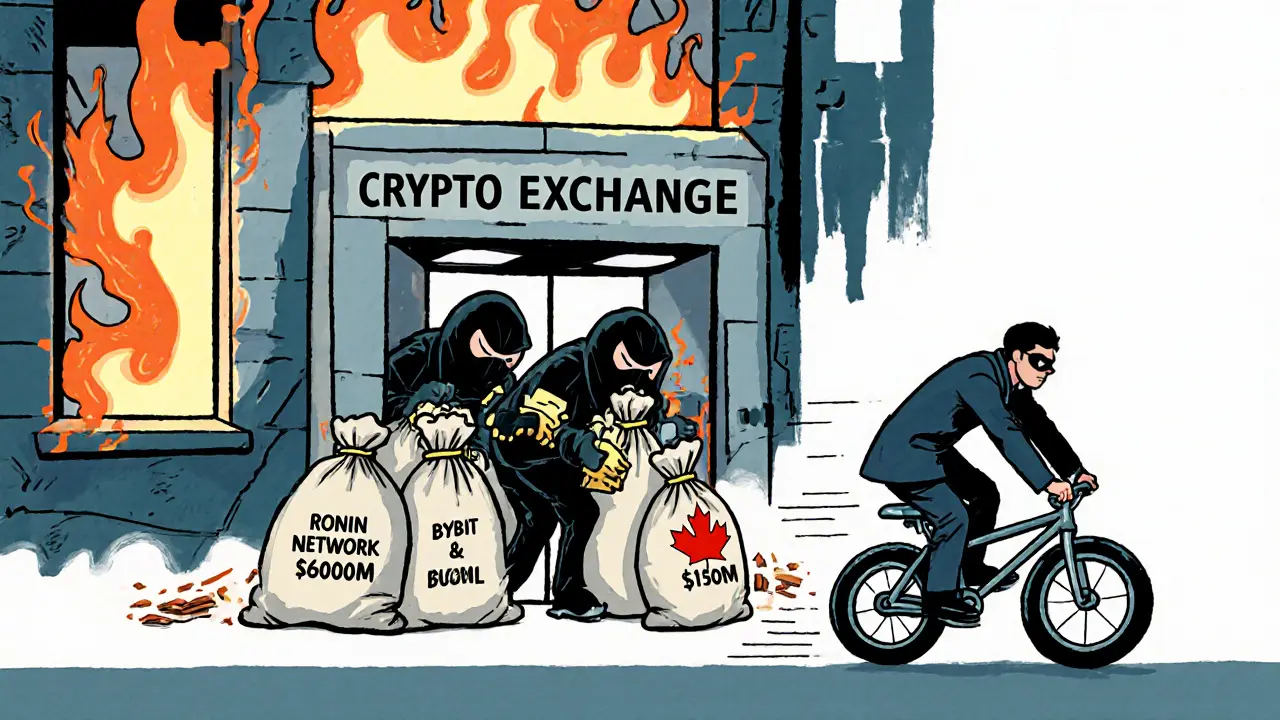North Korea Crypto Theft Calculator
North Korea has stolen an estimated $3 billion in cryptocurrency since 2017 to fund nuclear weapons and missile programs. This calculator shows how these stolen funds translate into real-world weapons production.
Weapons Impact
$0 could fund one intercontinental ballistic missile
$0 could fund one nuclear warhead
$0 could fund enough chemical weapons for one attack
$0 could fund one missile test
Based on U.N. estimates: 60% of North Korea's defense budget now comes from cybercrime. One ICBM costs ~$100 million. One nuclear warhead costs ~$150 million. One missile test costs ~$20 million.
$0 of stolen cryptocurrency could fund $0 worth of weapons. This is $0 less than North Korea's annual defense budget.
North Korea doesn’t need oil exports or foreign investment to keep its nuclear weapons program running. Instead, it’s hacking crypto wallets, stealing millions in bitcoin, and turning digital theft into intercontinental ballistic missiles. Since 2017, Pyongyang has stolen an estimated $3 billion in cryptocurrency - money that directly fuels its nuclear bombs, missile tests, and chemical weapons research. And despite global sanctions, cybercrime laws, and international pressure, the thefts keep happening. Why? Because cryptocurrency doesn’t care about borders, diplomats, or UN resolutions.
How the Heists Work
North Korea doesn’t break into vaults. It breaks into code. Its hackers - mostly operating under groups like Lazarus Group and APT38 - don’t rely on brute force. They use social engineering, fake resumes, and impersonation to get inside crypto companies. One operative posed as a Canadian IT contractor. Another pretended to be a freelance blockchain developer from Japan. They aced video interviews, got hired, and then quietly stole private keys or seed phrases from inside the company’s network. Once they’re in, they don’t just grab a few coins. They drain entire hot wallets. In 2022, they stole $600 million from the Ronin Network, the bridge behind the Axie Infinity game. In 2023, they hit Bybit, one of the world’s largest crypto exchanges, and walked away with over $150 million. These aren’t random attacks. They’re coordinated, state-backed operations. The U.S. Treasury has confirmed these groups report directly to North Korea’s Bureau 121 - the military’s cyber warfare unit.The Role of Crypto Mixers
Stolen crypto is useless if you can’t spend it. That’s where crypto mixers come in. These services take your stolen coins, pool them with thousands of other transactions, and send back “clean” coins to a new wallet. The trail disappears. No bank, no regulator, no blockchain explorer can trace the original source. North Korea uses mixers like Tornado Cash (before it was banned) and newer, less-known platforms based in Southeast Asia. The stolen funds get shuffled through 5-10 different wallets before being converted into stablecoins like USDT or exchanged for cash via peer-to-peer traders in Thailand, Vietnam, or Cambodia. From there, it’s funneled into shell companies, real estate, or luxury goods - all of which eventually feed back into weapons programs. The FBI has tracked six specific Bitcoin addresses holding over $40 million in stolen funds. One of them -3LU8wRu4ZnXP4UM8Yo6kkTiGHM9BubgyiG - has been active since 2021. It’s still receiving deposits. Still moving. Still funding missiles.
Why Sanctions Don’t Work
Traditional sanctions target banks, shipping routes, and oil tankers. But cryptocurrency skips all of that. There’s no central bank to freeze. No SWIFT system to block. No compliance officer to flag a suspicious transfer. Crypto moves peer-to-peer, across borders, in seconds. North Korea exploits this gap. While the U.S. and EU can shut down a North Korean bank account in Moscow, they can’t shut down a wallet in the Philippines that holds $20 million in ETH. Even when wallets are identified, the hackers just create new ones. The number of known North Korean crypto addresses has grown from 12 in 2018 to over 1,200 today. And unlike traditional money laundering - which requires paperwork, compliance, and human intermediaries - crypto laundering is automated, cheap, and global. A single hacker in Pyongyang can run dozens of mixing scripts from a laptop while sipping tea in a state-run apartment.
Who’s Doing the Hacking?
You won’t find these hackers in military uniforms. They’re young, tech-savvy, and trained in Pyongyang’s elite cyber academies. Many studied computer science in China before being recruited. Some have been spotted working from hotels in Kuala Lumpur or Bangkok under fake passports. Others operate remotely from within North Korea, using state-provided internet access that’s tightly controlled but still connected to the global network. The Lazarus Group alone has been linked to over 50 major attacks since 2017. The group has a clear hierarchy: coders write the exploits, analysts track wallet movements, and officers in Pyongyang approve the final cash-out targets. The U.S. Department of Justice has charged nine individuals in connection with these operations - all of them believed to be North Korean nationals living abroad under false identities. South Korea and Japan now track these hackers as seriously as they track missile launches. In 2023, Seoul launched a new offensive cyber unit specifically to counter North Korean crypto theft. The U.S. has responded with rewards: up to $15 million for information leading to the disruption of these operations.The Real Cost: Nuclear Weapons and Missiles
Every stolen bitcoin, every laundered ether, every converted stablecoin ends up in one place: the weapons program. U.N. inspectors estimate that 60% of North Korea’s annual defense budget now comes from cybercrime. In 2024 alone, they tested six ballistic missiles - including one capable of reaching the continental U.S. - and fired dozens of short-range systems into the Sea of Japan. These aren’t just tests. They’re demonstrations. And they’re funded by stolen crypto. The regime doesn’t need to sell coal or export labor. It doesn’t need to rely on China for cash. It has its own digital printing press - one that never prints paper, but instead prints trustless, decentralized, untraceable money.
What’s Being Done?
Governments are trying. The U.S. Treasury has sanctioned over 100 crypto wallets linked to North Korea. The FBI publishes weekly alerts on suspicious transactions. Crypto exchanges like Binance and Coinbase now block known North Korean addresses. But the arms race continues. New tools like blockchain analytics firms - Chainalysis, Elliptic, and TRM Labs - help track the money. But hackers adapt. They use decentralized exchanges (DEXs), privacy coins like Monero, and cross-chain bridges to move funds without leaving a trace. The truth? We’re losing ground. North Korea’s cyber unit has grown from 1,800 hackers in 2017 to an estimated 6,000 today. They’re not just stealing crypto. They’re building a new kind of economy - one that exists outside the rules of the world.What Comes Next?
If nothing changes, North Korea will keep stealing. And it will keep building. By 2026, experts predict the regime could be funding its entire nuclear arsenal through crypto alone. The U.S. and its allies are pushing for global crypto regulations - mandatory KYC for all exchanges, real-time transaction monitoring, and international blacklists of wallet addresses. But regulation moves slowly. Hackers move fast. The only real defense? Collaboration. Crypto companies need to share threat intelligence. Governments need to act together. And users need to understand: when you leave your keys exposed, you’re not just risking your wallet. You’re helping fund a regime that wants to destroy you.How much money has North Korea stolen through cryptocurrency?
Between 2017 and 2023, North Korea stole an estimated $3 billion in cryptocurrency, according to U.N. investigators and U.S. intelligence reports. The thefts continue, with over $500 million stolen in 2023 alone, mostly through exchanges, DeFi protocols, and gaming platforms.
Which hacking group is behind North Korea’s crypto thefts?
The Lazarus Group, also known as APT38, is the primary hacking unit responsible. It operates under North Korea’s Bureau 121, a military cyber unit directly tied to the regime’s weapons programs. Lazarus has been linked to major hacks including the Ronin Network ($600M), Bybit ($150M), and the Harmony Bridge ($100M).
How do North Korean hackers launder stolen crypto?
They use crypto mixers to blend stolen coins with other transactions, making them untraceable. After mixing, funds are converted into stablecoins like USDT, then moved through decentralized exchanges or peer-to-peer traders in countries like Thailand or Vietnam. Finally, the money is converted to cash or used to buy goods that can be shipped back to North Korea.
Why can’t sanctions stop this?
Sanctions target banks, shipping, and traditional finance. Cryptocurrency operates outside that system. There’s no central authority to freeze accounts. Transactions happen peer-to-peer, across borders, without intermediaries. Even when wallets are identified, hackers simply create new ones - and they’re getting better at hiding them.
Can crypto companies prevent these attacks?
Yes - but only if they treat security like a national priority. Most hacks happen because of weak internal controls: reused passwords, unsecured private keys, or hiring insiders without background checks. Companies that use multi-signature wallets, conduct third-party audits, and monitor for unusual wallet activity have significantly reduced their risk. The biggest vulnerability isn’t the blockchain - it’s the people.

6 Comments
Let’s be real - this isn’t even a headline anymore, it’s a fucking weekly report. $3 billion stolen? That’s just the tip of the iceberg. Lazarus Group isn’t some rogue gang - it’s a state-run fintech startup with better R&D than most Silicon Valley firms. They don’t even need zero-days anymore; they just LinkedIn-scam their way into junior dev roles and walk out with the whole damn ledger. And you think sanctions matter? LOL. Crypto doesn’t care about your UN resolutions. It’s decentralized chaos, and North Korea is the only one playing it right.
omg this is wild 😱 i had no idea they were using mixers like tornado cash and then flipping it to usdt in thailand?? i just lost $200 to a phishing link last month and felt so dumb… but this?? they’re literally funding nukes with stolen meme coins 🤯 hope the fbi catches them soon… also pls use 2fa people!!! 🙏
THIS IS A FALSE FLAG. The entire crypto theft narrative is a distraction. The U.S. and Israel are behind this. Why? To justify more surveillance on blockchain, to push CBDCs, and to scare normal people into trusting banks again. The 'Lazarus Group'? Probably a CIA front. Look at the timing - right after the Fed started talking about crypto regulation. And don’t tell me about those wallet addresses - they can be faked with quantum spoofing. They’re using this to sell you fear so you’ll hand over your privacy. Wake up. They’re not stealing crypto - they’re stealing your freedom.
There’s a structural vulnerability here that’s being grossly under-addressed. The attack surface isn’t the blockchain - it’s the human layer. Identity verification, credential hygiene, and internal access controls are the real weak points. Most firms treat security as an afterthought, not a core competency. We need mandatory zero-trust architectures for all custodial entities. Multi-sig wallets aren’t optional - they’re table stakes. And incident response teams need to be on 24/7 alert, not just quarterly audits. The cost of inaction isn’t just financial - it’s existential. This isn’t a crypto problem. It’s a national security failure wrapped in a tech veneer.
Oh look, the Kim dynasty upgraded from nukes to NFTs. How quaint. We spend billions on defense contracts and then let some guy in Pyongyang type into a terminal and fund a missile program with stolen Dogecoin. Meanwhile, my local bank still can’t fix their login page. The U.S. government’s response? ‘We’ve sanctioned 100 wallets.’ Congrats. You just made a list of dead addresses. The real problem? We’re still treating digital theft like it’s 2008. Meanwhile, Pyongyang’s hackers are already on Web3.4. Maybe we should stop pretending this is a financial crime and start treating it like cyber warfare. Oh wait - we did. We just forgot to bring the weapons.
Thank you for this comprehensive and sobering breakdown. The intersection of cybercrime and national security is one of the most urgent challenges of our time - and yet, public awareness remains dangerously low. What’s especially troubling is how easily ordinary users become unwitting enablers: weak passwords, reused keys, ignoring multi-signature protocols. This isn’t just about state actors - it’s about collective responsibility. We must advocate for better security standards, support ethical blockchain analytics, and hold exchanges accountable. The weapons aren’t just funded by stolen crypto - they’re enabled by our apathy. Let’s not be passive participants in our own vulnerability.